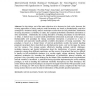Free Online Productivity Tools
i2Speak
i2Symbol
i2OCR
iTex2Img
iWeb2Print
iWeb2Shot
i2Type
iPdf2Split
iPdf2Merge
i2Bopomofo
i2Arabic
i2Style
i2Image
i2PDF
iLatex2Rtf
Sci2ools
123
click to vote
SAC
2006
ACM
2006
ACM
Interval-based robust statistical techniques for non-negative convex functions, with application to timing analysis of computer
: In chip design, one of the main objectives is to decrease its clock cycle; however, the existing approaches to timing analysis under uncertainty are based on fundamentally restrictive assumptions. Statistical timing analysis techniques assume that the full probabilistic distribution of timing uncertainty is available; in reality, the complete probabilistic distribution information is often unavailable. Additionally, the existing alternative of treating uncertainty as interval-based, or affine, is limited since it cannot handle probabilistic information in principle. In this paper, a fundamentally new paradigm for timing uncertainty description is proposed as a way to consistently and rigorously handle partially available descriptions of timing uncertainty. The paradigm is based on a formal theory of interval probabilistic models that permit handling parameter uncertainty that is described in a distribution-free mode - just via the range, the mean, and the variance. This strategy perm...
| Added | 14 Jun 2010 |
| Updated | 14 Jun 2010 |
| Type | Conference |
| Year | 2006 |
| Where | SAC |
| Authors | Michael Orshansky, Wei-Shen Wang, Martine Ceberio, Gang Xiang |
Comments (0)

